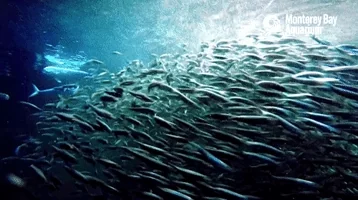Ocean warming
to cancel increased carbon dioxide-driven productivity
University of Adelaide
 University of Adelaide
researchers have constructed a marine food web to show how climate change could
affect our future fish supplies and marine biodiversity.
University of Adelaide
researchers have constructed a marine food web to show how climate change could
affect our future fish supplies and marine biodiversity.
Published in Global
Change Biology, the researchers found that high CO2 expected
by the end of the century which causes ocean acidification will boost
production at different levels of the food web, but ocean warming cancelled
this benefit by causing stress to marine animals, preventing them using the
increased resources efficiently for their own growth and development. The
result was a collapsing food web.
"Humans rely heavily on a diversity of services that are provided by ocean ecosystems, including the food we eat and industries that arise from that," says project leader Professor Ivan Nagelkerken, from the University's Environment Institute.
"Our
understanding of what's likely to happen has been hampered by an over-reliance
on simplified laboratory systems centred on single levels of the food web. In
this study, we created a series of three-level food webs and monitored and
measured the results over a number of months to provide an understanding of
future food webs under climate change."
The researchers
constructed marine food webs based on plants which use sunlight and nutrients
to grow (algae), small invertebrates that graze on the plants (such as shrimp),
and fish that in turn prey on small invertebrates. They had 12 large aquaria
with different species to mimic seagrass, open sand and rocky reef habitats,
simulating tidal movements with circular currents.
The food webs were
exposed to the levels of ocean acidification and warming predicted for the end
of this century. Over several months, the researchers assessed the basic
processes that operate in food webs like predation and growth of organisms.
"Elevated carbon
dioxide concentrations boosted plant growth; more plant food meant more small
invertebrates, and more small invertebrates, in turn, allowed the fish to grow
faster," says PhD candidate Silvan Goldenberg, who is supervised by
Professor Nagelkerken and Professor Sean Connell.
"However, ocean
warming cancelled this benefit of elevated carbon dioxide by causing stress to
the animals, making them less efficient feeders and preventing the extra energy
produced by the plants from travelling through the food web to the fish. At the
same time, fish were getting hungrier at higher temperatures and started to
decimate their prey, the small invertebrates."
The researchers found
that ocean warming would be an overwhelming stressor that made food webs less
efficient, neutralised the 'fertilising' effect of elevated carbon dioxide and
threw the fragile relationship between predators and prey off balance.
"The consequences
for marine ecosystems are likely to be severe," says Professor
Nagelkerken. "Oceans in the future may provide less fish and shellfish for
us to eat, and larger animals that are at the top of the food web, in
particular, will suffer. We hope this study will provide predictive
understanding which is critical for effective fisheries management."